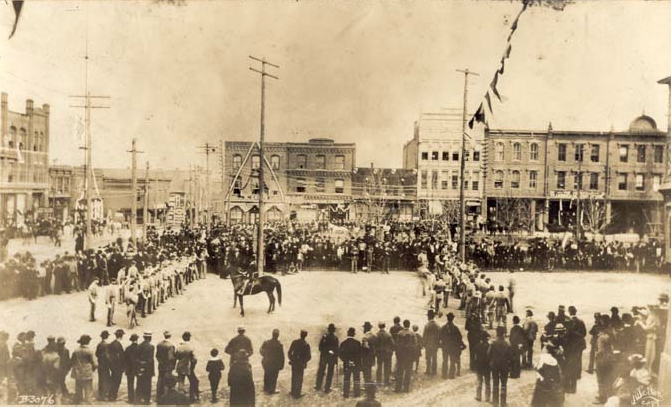We continue with Edwin Bedford Jeffress’ 1950 Asheville Citizen article, “Jeffress, Former Newspaperman Here, Describes Asheville of 1908-11.” In this week’s excerpt, Jeffress revisits his two-year tenure teaching at The Bingham School.
In 1891, Robert Bingham opened The Bingham School in Asheville, a military boys prep school. The Bingham family operated the school in three previous locations: Wilmington, Pittsboro and Hillsboro. The Asheville location closed in 1928 after Bingham’s death.
Thanks as always to the Pack Memorial Library’s Special Collections, North Carolina Room for its assistance. For our previous excerpt from Jeffress, click here.
On March 26, 1950, Jeffress wrote:
After graduating from the University of North Carolina, I accepted a position to teach at Bingham School, that great school for boys which was operated by Colonel Robert Bingham and his sons-in-law…
…
The Colonel operated his school on an individualistic basis. For the school he used what was known as Bingham’s time. This time was based on sun time and differed an hour from Asheville time. The school worked straight through, and on Monday had a day off. With it all, the Colonel was a great educator. In the absence of an efficient public school system in much of the South, it was an outstanding institution, drawing patronages from wide areas of the South. The Colonel was a strict disciplinarian and boys had to observe the school code even when the grey uniforms filled the streets of Asheville on Sundays after church or Monday. If the boys got an excess of demerits, they had to take turns in the guard house and a “bread and water diet.” The victim could take along blankets and sleep it off if he so chose. Sunlight brought release.
Colonel Bingham was a crony and great friend of that other educator who operated at Bell Buckle, Tenn., Sawney Webb. They liked to swap experiences with the wayward youths. Colonel Bingham insisted upon honor among the students. If one thought he was insulted by another student, he could invite his aggressor to the “grass,” the center of the dividing line between the rows of one-story buildings serving as barracks. There they could pound each other under supervisions of the battalion officer, with bare hands until they felt satisfied. The very presence of this custom was sufficient to prevent its use. In my two years there I do not recall its use once. But as an escape means, it was a valuable adjunct to training upon which the Colonel insisted. Maybe if we had more of the Colonel Binghams we could solve some of the juvenile delinquency cases so pestering citizenship today.
Next week Jeffress recalls his life as a reporter.




Before you comment
The comments section is here to provide a platform for civil dialogue on the issues we face together as a local community. Xpress is committed to offering this platform for all voices, but when the tone of the discussion gets nasty or strays off topic, we believe many people choose not to participate. Xpress editors are determined to moderate comments to ensure a constructive interchange is maintained. All comments judged not to be in keeping with the spirit of civil discourse will be removed and repeat violators will be banned. See here for our terms of service. Thank you for being part of this effort to promote respectful discussion.